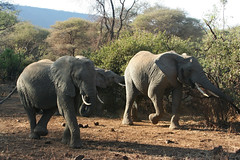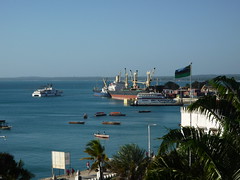 坦尚尼亞有關當局在24日表示,官員們在桑給巴爾(Zanzibar)港裝魚乾的麻袋內,查獲了1041隻象牙。桑給巴爾位在印度洋,坦尚尼亞東方22英里處。而裝載這些象牙的貨櫃文件顯示,其目的地是馬來西亞。
坦尚尼亞有關當局在24日表示,官員們在桑給巴爾(Zanzibar)港裝魚乾的麻袋內,查獲了1041隻象牙。桑給巴爾位在印度洋,坦尚尼亞東方22英里處。而裝載這些象牙的貨櫃文件顯示,其目的地是馬來西亞。
當局破獲此案的同時,為期一週的打擊野生動物非法貿易的培訓營隊正在波扎納的哈博羅內(Gaborone)舉行。該營隊由國際刑警組織與國際動物福利基金會(IFAW)共同舉辦,共有南部非洲11個國家的27位保育警察參加。
IFAW的野生動物貿易計畫主任Kelvin Alie說,「這次行動清楚呈現了目前國際刑警組織在野生動物執法的培訓成果,IFAW在哈博羅內所推行的行動,對大象保護相當重要,特別是在剛果盆地備受威脅的象群。」「在我們進行打擊象牙貿易的執法訓練時,大象仍持續因為象牙走私而受害」。
另一方面,保育人士也對這次查獲行動表示「震驚」。「生而自由基金會」(Born Free Foundation)執行長以及「物種存續網絡」(Species Survival Network)執行長Will Travers說,「試想一下,在單單一個貨櫃中,就代表至少有521頭大象死亡。」「這個消息讓我們從心底受震撼,使我們更需下定決心,加倍努力打擊大象盜獵以及非法象牙貿易問題」。
華盛頓公約(CITES)1989年通過了全面性的象牙貿易禁令,在此之前的10年,已有70萬頭大象遭血腥屠殺。但從1989年至今,有不少人試圖重啟象牙合法貿易,CITES也兩度解禁。
Travers 表示,「許多專家認為,保育大象的戰爭不僅在非洲森林或草原,甚或是遠東地區的象牙市場,也在CITES的權力走廊內,非洲的大象需要我們採行動,現在就要。」
在175個締約國的CITES體制內,大象戰爭確實在上演,大象與象牙貿易問題,應該是其中最具爭議且分歧。
1999年,CITES批准辛巴威、納米比亞以及波扎納58噸象牙出口至日本。2008年,中國隨著日本之後成為「象牙貿易夥伴」,當時,贊成此議的英國提出的說詞是,適度滿足中國市場需要可減少盜獵。
2009年,CITES第二度批准象牙貿易,重達108噸的象牙銷往中國與日本。儘管國際社會譴責這樣的合法貿易只會刺激需求,進而增加盜獵。
 2010年,坦尚尼亞與尚比亞都向CITES提出出售庫存象牙的要求。然而,由23個有非洲象分布國家所組成的非洲大象聯盟(African Elephant Coalition),力阻此事發生。在每三年舉行一次的CITES會議上,可以預見會有更多對象牙貿易的要求。
2010年,坦尚尼亞與尚比亞都向CITES提出出售庫存象牙的要求。然而,由23個有非洲象分布國家所組成的非洲大象聯盟(African Elephant Coalition),力阻此事發生。在每三年舉行一次的CITES會議上,可以預見會有更多對象牙貿易的要求。
保育人士指出,大象盜獵的問題持續擴大。Travers 說,「僅僅是今年就已查獲上萬公斤的非法象牙,而遠東地區的非法象牙價格也持續飛漲。」
最近一份由歐盟資助的報告《非法獵殺大象監視計劃(MIKE)》顯示,跨越非洲東部、南部與中部的盜獵趨勢正在增加。
生而自由的野生動物貿易專家Shelley Waterland說,「地球上沒有足夠的大象可以滿足亞洲對象牙的需要。」
「執法工作是必須的,但減少需求一樣重要。如果我們抱著要保持目前大象在其分布地狀況的希望,全面禁止任何的象牙貿易是唯一的辦法。」Waterland表示,「如果威脅的程度有增無減,許多脆弱的族群將無法存活下去。」
中國是目前被CITES認為非法象牙最大的單一消費國。Travers 說,「隨著中國人民可支配收入的增加,許多人認為需求將會繼續上升。」
有鑒於問題的急迫性,生而自由呼籲將中國由核准的象牙貿易夥伴名單中撤除。
此外,保育人士指出,執法需要經費。Alie說,「大象分布境內的國家需要國際社會在財政上的支持,讓這些具有高度技巧以及動機的受訓者可以滿足保護大象的任務,並且阻止促進盜獵以及非法貿易的合法象牙交易。」
Tanzanian officials have confiscated 1,041 elephant tusks they found hidden in sacks of dried fish at the Port of Zanzibar, authorities said on Wednesday. The island of Zanzibar is located in the Indian Ocean, about 22 miles off the coast of mainland Tanzania.
Shipping documents for the container in which the elephant tusks were discovered show the destination as Malaysia.
The seizure comes as 27 wildlife law enforcement officials from 11 Southern African countries gather in Gaborone, Botswana this week for a training session on the prevention of illegal trade in wildlife given jointly by Interpol and the nonprofit International Fund for Animal Welfare.
"This seizure makes it clear that the ongoing Interpol wildlife enforcement training, which IFAW is supporting in Gabarone, is vital to saving elephants - particularly those elephants of the Congo Basin which are most threatened," said Kelvin Alie, IFAW's Wildlife Trade Programme director. "While we gather to discuss combating the ivory trade, elephants continue to be killed for their ivory."
Yet conservationists say they were "stunned" by news of the seizure. "Just imagine discovering the remains of at least 521 dead elephants in a single haul," said Will Travers, CEO of the Born Free Foundation and president of the Species Survival Network. "This news has truly numbed us all to the core, and made us even more determined to redouble our efforts in the fight against elephant poaching and the illegal ivory trade."
The Convention on International Trade in Endangered Species, CITES, approved a complete ban on trade in ivory in 1989, following a decade of bloodshed when 700,000 elephants were slaughtered. But since then there have been numerous concerted efforts to re-open legal trade, and two legal sales of ivory approved by CITES.
"Many experts believe the battle for elephants must not only be fought in the forests or on the savannahs of Africa, or even in the ivory markets of the Far East, but in the corridors of power at CITES, the Convention on International Trade in Endangered Species," said Travers. "Africa's elephants need action - and they need it now."
The elephant battles at CITES are truly something to behold. Elephant and ivory trade discussions are possibly the most divisive and contentious issues discussed by the 175 countries that have signed the treaty.
In 1999, CITES approved a legal export of 58 tonnes of ivory from Zimbabwe, Namibia and Botswana to Japan.
In 2008, China joined Japan as an approved "ivory trading partner" in a decision that the United Kingdom government justified at the time as an attempt to satisfy demand and thus reduce poaching.
In 2009, the second CITES-approved shipment of 108 tonnes of ivory to China and Japan took place, despite an international outcry that such legal trade would surely only stimulate demand, and therefore increase poaching.
In 2010, Tanzania and Zambia both asked CITES for approval to sell their stockpiled ivory. However, a group of 23 African elephant range states, known as the African Elephant Coalition, prevented this from happening. More ivory trade proposals are predicted for future CITES meetings, which take place every three years.
Conservationists point out that elephant poaching levels now are rising. "Seizures of illegal ivory this year alone run into tens of thousands of kilos; and the price of illegal raw ivory in the Far East has risen exponentially," Travers said.
A recent report by the EU-funded Monitoring the Illegal Killing of Elephants Programme (MIKE) reveals an upward trend in poaching across East, Southern and Central Africa.
"There are not enough elephants left on this planet to meet Asian demand for ivory," said Shelley Waterland, Born Free's wildlife trade expert.
"Enforcement efforts are essential, but so is reducing demand. A complete ban on any trade in ivory whatsoever must be the only way forward if we are to have any hope of saving elephants across their current range," Waterland said. "Many fragile populations will simply not survive for very much longer if this level of threat continues unabated."
China is now recognized by CITES as the single biggest consumer of illegal ivory. "With the growth in disposable income of Chinese citizens," Travers says, "many believe the demand will keep on rising."
As a matter of urgency, Born Free is calling for China's status as an approved ivory trading partner to be withdrawn.
In addition, conservationists say money is needed to support law enforcement. "What elephant range states now need is the commitment of the international community to financially support these highly skilled and motivated trainees to be able to meet the task of protecting elephants and stop the legal trade in ivory which facilitates poaching and illegal trade," said Alie.
全文及圖片詳見:ENS報導


